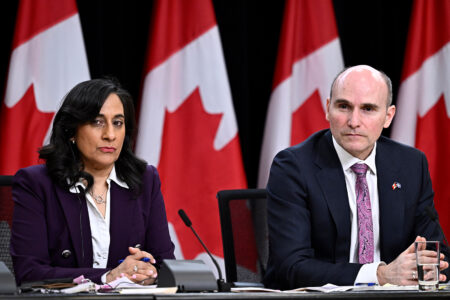
Governments have been hearing for decades about how they should change to keep pace with an increasingly digital society. Public servants are urged to make their organizations “agile,” “connected,” “responsive,” “user-centric,” “open” and “innovative.” They are told that the world is increasingly complex, or that the rate of technological progress is too fast for governments to keep up, so governments need to change fundamentally.
During the research for my report Governance in the Digital Age, I heard two competing analyses. One is that the structures and designs of government aren’t set up for digital-era governance. The other is that our public governance has been reasonably effective in the digital age; in fact, Canada’s civil service has been ranked as the most effective in the world, and we can find some stellar success stories of digital transformation and open government.
A year of research and interviews with about 300 government practitioners and stakeholders in Canada and around the world suggests that the first analysis is accurate. This means that governments are changing only at the surface — rarely at their foundations. This could be because they are misdiagnosing the problem, coming up with the wrong solutions or failing to implement solutions correctly.
So what can be done? Governments need to embrace complexity and invest far more in skill sets and systems designed to adapt constantly to unknowable futures.
As it stands, initiatives to transform governance across jurisdictions rely on a web of workarounds, fast tracks and exemptions. Interviewees told stories of progress in digital transformation followed by backslide. Sometimes, the departure of one key official was enough to derail a whole program. Meanwhile, those at the top were often unaware of the challenges with their transformation initiatives because they were disconnected from the day-to-day experience of both employees and the citizens on the user end of services and programs.
There are no certain solutions, only choices. But there are proven and promising approaches for reliably making good choices over time in new and changing contexts. In Progressive Governance for Canadians: What You Need to Know (2007), the Crossing Boundaries working group declared that “governments must stop trying to plan for things they cannot know and focus instead on learning to manage change.”
To support that goal, governments should invest in four complementary strategies.
1. Build process skills
Organizational learning doesn’t happen on its own. In an era that lacks playbooks, maps and right answers, it is crucial to build process skills that help organizations navigate unfamiliar territory. People with these skills include user experience researchers, designers, foresight specialists and citizen-engagement practitioners; they help organizations map systems, understand complexity and collaboratively imagine the future.
It’s rare for a team in an organization to need, for instance, a designer or an engagement specialist full-time, but many teams need those kinds of skills occasionally. Organizations have to muddle through or compete with each other to recruit from a supply-starved skills market. This is where investments like the Canadian Digital Service, the data science hubs in the federal and British Columbia governments, and innovation labs shine: they let governments make the decision once to make expertise available to the projects and teams that need it most.
2. Develop subject matter expertise
Governments can’t throw generalists at problems in specialized fields and expect solid outcomes. Optimists (typically profit-motivated) tend to drive the discourse about technological change; those who believe in the value of an emerging technology are those who will invest, develop and experiment. Academics and public sector voices follow years behind, only once the technology starts generating societal or economic impacts.
Attending a one-day conference on artificial intelligence doesn’t scratch the surface for the understanding required to consider impacts on governance. Governments need to take specialized expertise far more seriously, including knowing what expertise is needed in the first place. For rapidly changing fields, this means that learning and community engagement will have to become a core part of people’s jobs and day-to-day time — not an occasional refresher.
3. Protect the public good in a fast-paced world
The growth of digital technology has changed the working context for public officials. In a slow-moving world, fundamental principles about public governance and the roles of public servants — the “public service ethos” — become embedded in policies and processes over time. But in a dynamic, fast-moving world like ours, officials must constantly apply these principles to new contexts.
Public servants see the need to leverage new possibilities and approaches, such as crowdsourcing, digital engagement, social media, artificial intelligence, challenge prizes, platform models and so on. As they adapt, some important questions arise: Do the people who understand the public good understand how the world is changing? Do the people who understand how the world is changing understand the public good?
With improved subject matter expertise, public servants will be able to answer yes to the first question. For the second, as governments interact with external players, they have to find ways to emphasize, communicate and reinforce the principles of the public sector’s role in a digital age.
4. Foster transparency and openness
Transparency and openness are critically important because they support collaboration and enable an honest accounting of successes and challenges across an organization. Governments that take part in larger collaborative networks need to be open and transparent about the data and information they’re working from, and the rationales for their decisions.
A major problem in achieving digital-era transparency and openness is that nobody has a complete view of what’s happening at the delivery layer of government. The people who are designing organizations and are most responsible for what they do are especially cut off from that perspective. Time spent watching users interact with a service leads to empathy, which leads to more user-oriented and design-oriented organizations. The question is how to scale this process up across the range of government-citizen interfaces. Currently accountability tends to be called upon only when a project fails spectacularly; policy gaps and citizens’ day-to-day frustrations are rarely captured, tracked and understood.
Change is more than “challenging”
Progress in digital governance is inevitable. But there’s no guarantee that we will ever get the exact progress we want, with the pace, scale and impact we want. Governments are struggling with change, and it’s not going to get any easier.
We hear that government transformation — as applied to open government, digital government, public sector innovation and technological disruption — is “challenging.” But that makes it sound like we can realize deep transformation with a little legwork and elbow grease. In reality, the word “challenge” drastically undersells the level of investment and commitment needed.
In the digital age, governments have to solve problems with an approach that is more holistic, that is more contextualized to meet people’s needs and that reflects more voices. This kind of change is inevitable as citizens’ expectations rise, and it will push governments toward more complex and decentralized governance. There are two options for governments: leave their organizations as they are and endure this transformation as it creates tensions and fractures within traditional organizational models; or make impactful decisions at the level of laws and institutions, and have genuine discussions about the nexus of accountability, expertise and responsibility.
This article is part of the Wiring Public Policy for Digital Government special feature.
Photo: Shutterstock by whiteMocca
Do you have something to say about the article you just read? Be part of the Policy Options discussion, and send in your own submission. Here is a link on how to do it. | Souhaitez-vous réagir à cet article ? Joignez-vous aux débats d’Options politiques et soumettez-nous votre texte en suivant ces directives.









